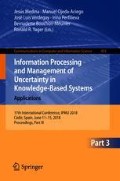Abstract
Every decision problem, understood as the need to take the best decision in some sense, leads to an optimization problem. There is a need to consider the “context” where each decision is made because it directly affects the underlying decision/optimization model with obvious implications in the change of the optimal solutions.
In this contribution this topic is further explored using the problem of locating emergency services (ambulances) in a set of available locations. A number of different contexts are considered and how they can be defined from an operational point of view is shown. The results obtained allowed to show how the best solutions of the problem may change.
Even using this simple example, we can conclude that the role of the context in decision/optimization problems and the need to properly define it should not be underestimated.
M. T. Lamata—This work is partially supported by projects TIN2014-55024-P from the Spanish Ministry of Economy and Competitiveness and P11-TIC-8001 from Junta de Andalucía (both including European Regional Funds).
Access this chapter
Tax calculation will be finalised at checkout
Purchases are for personal use only
References
Bagherinejad, J., Shoeib, M.: Dynamic capacitated maximal covering location problem by considering dynamic capacity. Int. J. Ind. Eng. Comput. 9(2), 249–264 (2018)
Basu, S., Sharma, M., Ghosh, P.S.: Metaheuristic applications on discrete facility location problems: a survey. Opsearch 52(3), 530–561 (2015)
Church, R., ReVelle, C.: The maximal covering location problem. Pap. Reg. Sci. Assoc. 32, 101–118 (1974). https://doi.org/10.1111/j.1435-5597.1974.tb00902.x
Colombo, F., Cordone, R., Lulli, G.: The multimode covering location problem. Comput. Oper. Res. 67(C), 25–33 (2016). https://doi.org/10.1016/j.cor.2015.09.003
Guzmán, V.C., Pelta, D.A., Verdegay, J.L.: An approach for solving maximal covering location problems with fuzzy constraints. Int. J. Comput. Intell. Syst. 9(4), 734–744 (2016). https://doi.org/10.1080/18756891.2016.1204121
Lamata, M.T., Verdegay, J.L.: On new frameworks for decision making and optimization. In: Gil, E., Gil, E., Gil, J., Gil, M.Á. (eds.) The Mathematics of the Uncertain: A Tribute to Pedro Gil, pp. 629–641. Springer, Cham (2018). https://doi.org/10.1007/978-3-319-73848-2_58
Lamata, M., Pelta, D., Verdegay, J.: Optimisation problems as decision problems: the case of fuzzy optimisation problems. Inf. Sci. (2017). https://doi.org/10.1016/j.ins.2017.07.035
Li, X., Zhao, Z., Zhu, X., Wyatt, T.: Covering models and optimization techniques for emergency response facility location and planning: a review. Math. Methods Oper. Res. 74(3), 281–310 (2011). https://doi.org/10.1007/s00186-011-0363-4
Peng, H., Qin, Y., Yang, Y.: Relationship between set covering location and maximal covering location problems in facility location application. In: Qin, Y., Jia, L., Feng, J., An, M., Diao, L. (eds.) Proceedings of the 2015 International Conference on Electrical and Information Technologies for Rail Transportation. LNEE, vol. 378, pp. 711–720. Springer, Heidelberg (2016). https://doi.org/10.1007/978-3-662-49370-0_74
Shi, Y., Tian, Y., Kou, G., Peng, Y., Li, J.: MCLP extensions. In: Optimization Based Data Mining: Theory and Applications, pp. 133–156. Springer, London (2011). https://doi.org/10.1007/978-0-85729-504-0_8
Sorensen, P., Church, R.: Integrating expected coverage and local reliability for emergency medical serviceslocation problems. Soc. Econ. Plann. Sci. 44(1), 8–18 (2010)
Zhang, B., Peng, J., Li, S.: Covering location problem of emergency service facilities in an uncertain environment. Appl. Math. Model. 51(Suppl. C), 429–447 (2017). https://doi.org/10.1016/j.apm.2017.06.043
Author information
Authors and Affiliations
Corresponding author
Editor information
Editors and Affiliations
Rights and permissions
Copyright information
© 2018 Springer International Publishing AG, part of Springer Nature
About this paper
Cite this paper
Lamata, M.T., Pelta, D.A., Rosete, A., Verdegay, J.L. (2018). Context-Based Decision and Optimization: The Case of the Maximal Coverage Location Problem. In: Medina, J., Ojeda-Aciego, M., Verdegay, J., Perfilieva, I., Bouchon-Meunier, B., Yager, R. (eds) Information Processing and Management of Uncertainty in Knowledge-Based Systems. Applications. IPMU 2018. Communications in Computer and Information Science, vol 855. Springer, Cham. https://doi.org/10.1007/978-3-319-91479-4_28
Download citation
DOI: https://doi.org/10.1007/978-3-319-91479-4_28
Published:
Publisher Name: Springer, Cham
Print ISBN: 978-3-319-91478-7
Online ISBN: 978-3-319-91479-4
eBook Packages: Computer ScienceComputer Science (R0)

